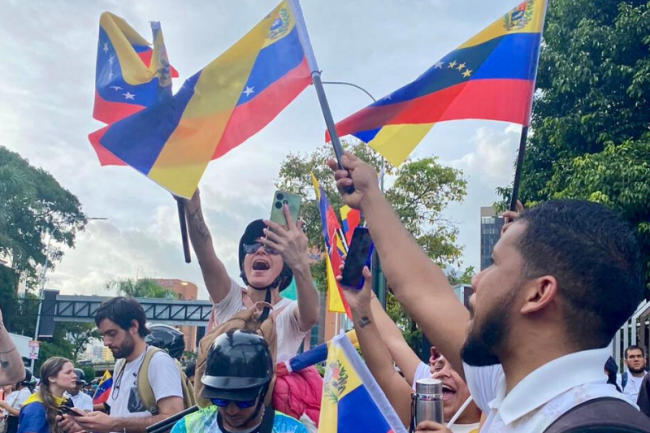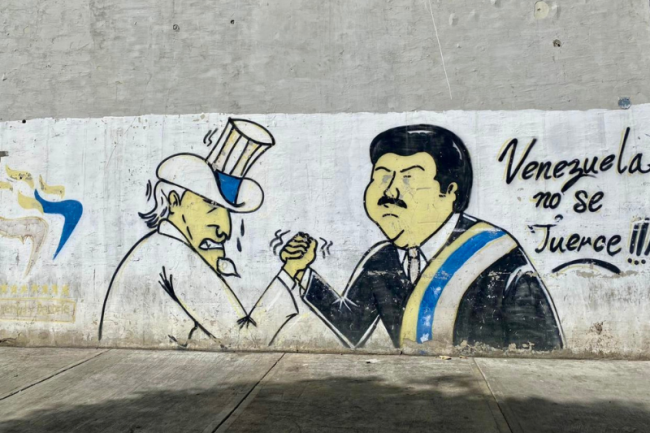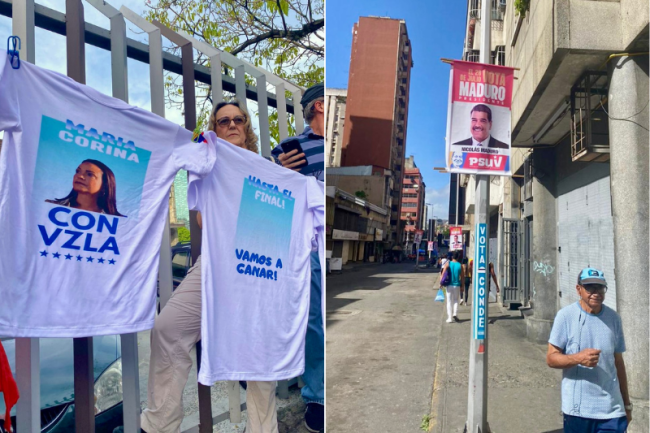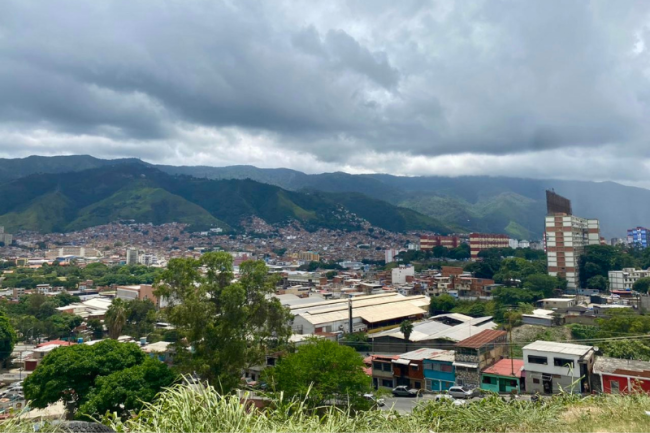
CARACAS, VENEZUELA—
Like many other Venezuelans, Noemí Hernández believes she has remade her life time and again. A few weeks ago, she returned home at 60 after migrating from her country in 2018. Initially, she fled economic crisis, but she eventually met another one in Argentina. She decided that was enough. "If I'm going to struggle,” she said, “I'd rather do it at home."
Returning to her home country, unlike when she left, she didn't find hyperinflation, a lack of basic goods, or work. Now, she’s leveraging different job offers and moved in with her sister to split costs and make ends meet.
“If you work, you can lead a normal life,” she said. “It won’t be luxurious, but you’ll survive.”
Venezuela, where voters head to the polls today to elect their president for the next six years, has seen an estimated 7.7 million locals leave the country since 2014 in a decade marked by social and economic turmoil. With a quarter of the country’s population now living abroad and a hard-hit society because of it, both leading candidates promise to bring their people back home if they win.
On the campaign trail, there has been constant discussion of the Venezuelan diaspora and the impact of the elections. Both sides promise reforms and growth that will help restructure a torn-apart social fabric. However, it is unclear what impact these changes could have on those who have fled their country and installed themselves elsewhere and, perhaps even more urgently, what those still on the perilous journey north would do.
Especially for migrants facing financial challenges abroad, the country's economic recovery since 2021 has made it easier for people like Hernández to return home. Many left due to economic collapse that saw hyperinflation soar to dizzying levels, dramatically devaluing the bolívar currency. While the world has seen the images of a shattered country in recent years, the streets of Caracas now show a different pulse: shops are filled with diverse products, local and imported; people are buying constantly, eating out, and enjoying juice and ice cream on the sultry streets.
That’s the postcard the Maduro government offers Venezuelans abroad, together with the promise of continuing the path that led the country to now be “fixed,” according to some. President since 2013, Maduro affirms that the over 350 sanctions that the United States has imposed in the past seven years, along with the freezing of Venezuelan assets in the U.S. during the Trump administration, have crippled the country and are the root causes of the crisis that led people to flee. After temporarily easing measures with a view to the presidential vote, the United States reimposed sanctions in April, saying Maduro failed to fulfill his commitment to guarantee fair elections.
“Eliminate all sanctions against our economy, against the Venezuelan people, and all of them [Venezuelan migrants] will be back within a year,” Maduro said recently.

The government claims that a million Venezuelans have returned to the country since 2018 under its “Return to the Homeland” program, which provides interested expats with a return ticket, legal assistance, financial aid, and social assistance to reintegrate their families into the country.
“Venezuela will amaze South America,” said Maduro recently as he claimed the program’s success.
But experts are skeptical of those numbers. Esteban Octavio Scuzarello, a PhD candidate studying Latin America migration at the European Institute, said the program doesn’t seem to be running, at least not on the scale the government advertises. “There’s no data, so you can’t tell how many of those entering are effectively returns or people coming to Venezuela and leaving again.”
Additionally, Scuzarello said that the lack of Venezuelan consulates across the region, especially in host countries such as Ecuador, the United States (due to damaged diplomatic relations), and Brazil (where many were shut down during the Bolsonaro administration), makes it difficult for people to seek repatriation.
Opposition leaders, on the other hand, promise to help the economy grow enough to bring people back home. The opposition claims the government has pushed people away by mishandling the economy and enhancing political persecution.
Running against Maduro is diplomat Edmundo González Urrutia, a stand-in for María Corina Machado, who won the opposition primary with 93 percent of the vote but was barred from participating in the election. Together, González and Machado—who has led the campaign on behalf of her surrogate—gather support from those who want “a change” both from a more moderate perspective, represented by González, and the more radical one that Machado embodies. Among the controversial positions she has held over the years include urging the United States to intervene in Venezuela, supporting the failed coup against President Hugo Chávez in 2002, and pledging to privatize PDVSA, the state oil company that accounts for 94 percent of the country's exports.
Recently, in an interview with the Wilson Center, González said that the diaspora is needed “to reconstruct the Venezuelan economy.”
“We need them here, and we need them badly,” he stressed.

In a country where most people know someone who has moved abroad, remittances play a role in keeping many families afloat. The Inter-American Dialogue estimates 29 percent of Venezuela households receive remittances, most significantly from the United States, amounting to 5 percent of GDP. Venezuelan government data shows the frequency and amount of remittances the country received reduced between 2021 and 2022.
Despite the signs of economic bounce back, some have said the ongoing impact of U.S. sanctions is akin to a gun to the heads of Venezuelan voters in this election. An opposition win means not only the end of 25 years of Chavista governments, but also the promise of foreign investment and the lifting of sanctions—major changes that could appeal to many who wish to see their loved ones return.
But promises and hypotheticals are just the beginning.
“It’ll all depend on what happens during the first months,” said Oscar Martínez, 38, who works in a grocery shop in Barrio 23, one of Caracas’ low-income barrios, and does independent, informal work to make ends meet. He has seen many of his friends flee, many struggling on the way to their destinations or in the countries where they settled due to lack of work, discrimination, and culture shock. Although some have returned, many refuse to do so before seeing what happens next.
“They’ll only return if whoever wins delivers,” he said.
Reflecting the polarized landscape, Martínez believes Venezuelans are "too emotional" about politics, and some may rush out of the country if Maduro wins. But he won’t go: challenges for Venezuelans abroad are too hard, with so many people leaving, he said.
Although 6.5 million Venezuelans have relocated within Latin America and the Caribbean, over half a million have made their way to the United States. The U.S. Department of Homeland Security reported a sharp increase in Venezuelan border crossers in 2022, when Republicans made much fanfare of the immigrant “invasion” while the Biden administration quietly deported some Venezuela asylum seekers to Colombia. In the U.S. election, the arrival of migrants from South and Central America, mostly, has been an important talking point.
While the anti-immigrant rhetoric intensifies, there are no signs that those crossing the Darien Gap and then Mexico in search of their “American dream” will give up any time soon. During his mandate, the Biden administration continued most Trump-era policies. In 2023, he pushed a crackdown on irregular crossings, which included the creation of the CBP One App, questioned by organizations for imposing new barriers on immigrants. Experts warn that these processes have not diminished the vulnerability of those willing to cross. Although the Biden administration introduced a humanitarian parole program for Venezuelans, the pathway excludes migrants who cross into Panama irregularly—the most common route to the United States.
Now, in the middle of a delicate campaign, the U.S. government is expected to try to prevent a mass entry through the southern border. In June, the Biden administration introduced a so-called “asylum ban” restricting access to asylum. Efforts to externalize the border also continue. As Panama’s new president José Raúl Mulino took office, DHS signed a memorandum of understanding to cover the cost of deporting border crossers into Panama, where Venezuelans have made up a significant portion of those entering through the Darien Gap.

Prevention through deterrence policies, however, only push migrants into more dangerous routes. “No matter how many you try to block people out, they want to enter the United States. They’ve got their people there, and people are choosing that,” said Scuzarello.
Donald Trump has made explicit that his migration policy will be mass deportation, or as close as he can get to that. The Democrats during the Biden administration—and, presumably, a potential Harris administration—insist on “legalizing” immigration in a way that limits the amount of migrants who are allowed to enter, a discourse that undermines the legal right to seek asylum. Another strategy has been creating alliances with other countries who are willing to take in migrants as they wait for their asylum cases to move forward, such as has happened with Mexico.
Ligia Bolivar, founder of the human rights organization AlertaVenezuela, remains skeptical about potential cooperation between governments to improve migrants’ situation and guarantee their return. On both sides of the border, she said, migration is being weaponized for economic purposes. “Why does Maduro speak with the United States government and not the opposition leaders?” she said. “Those conversations are more economic than political, as he’s aiming to get sanctions lifted.”
As voters head to the polls, most people I spoke to said they hope the election outcome will bring their loved ones back. However, although hopeful, most are sure that prosperity will take a long time to reach home.
Lucía Cholakian Herrera is a freelance reporter from Buenos Aires covering politics and human rights in Latin America.

